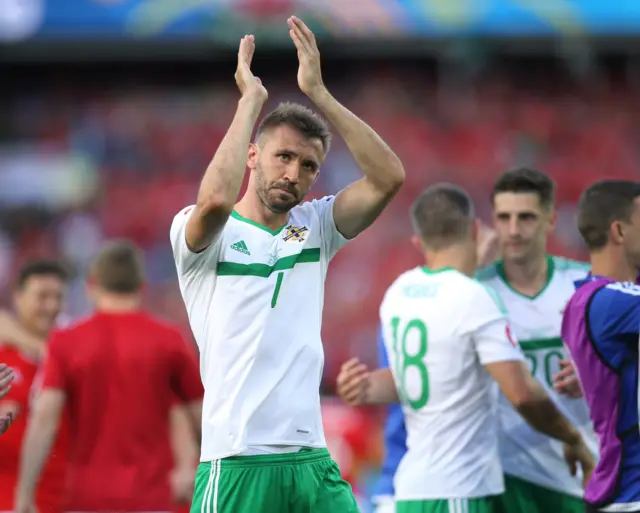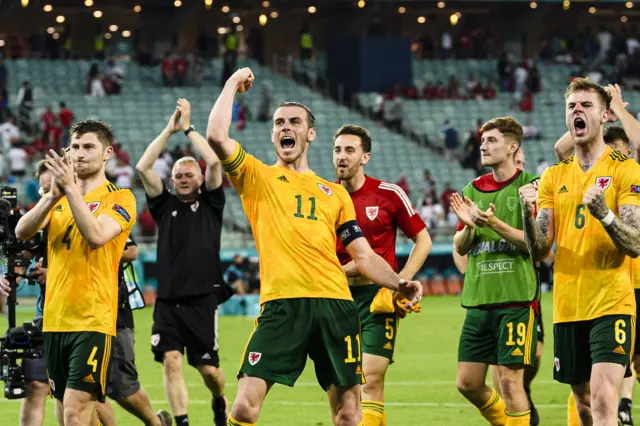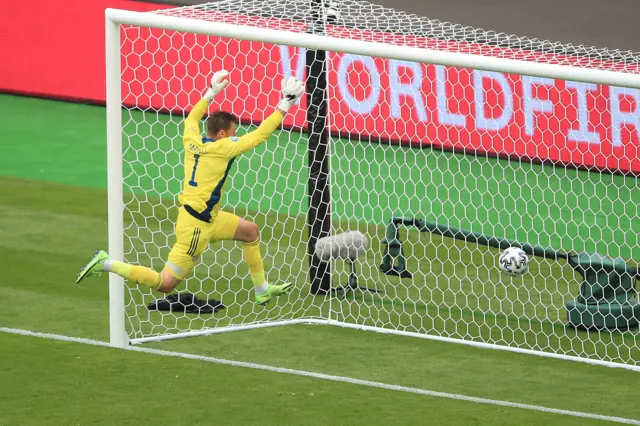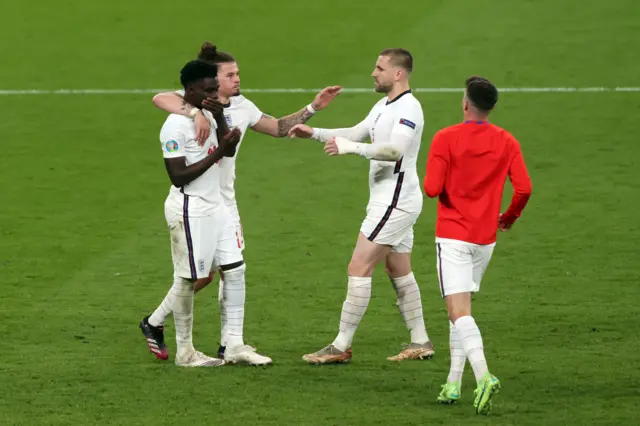Postpublished at 11:26 BST 9 October 2022
Group A: Spain
Germany as hosts are not in the draw
England drawn in Group C alongside Italy, Ukraine, North Macedonia and Malta
Scotland drawn in Group A with Spain, Norway, Georgia and Cyprus
Wales drawn in Group D with Croatia, Armenia, Turkey and Latvia
Northern Ireland drawn in Group H alongside Denmark, Finland, Slovenia, Kazakhstan and San Marino
Full groups below:
Group A: Spain, Scotland, Norway, Georgia, Cyrprus
Group B: Netherlands, France, Republic of Ireland, Greece, Gibraltar
Group C: Italy, England, Ukraine, North Macedonia, Malta
Group D: Croatia, Wales, Armenia, Turkey, Latvia
Group E: Poland, Czech Republic, Albania, Faroe Islands, Moldova
Group F: Belgium, Austria, Sweden, Azerbaijan, Estonia,
Group G: Hungary, Serbia, Montenegro, Bulgaria, Lithuania
Group H: Denmark, Finland, Slovenia, Kazakhstan, Northern Ireland, San Marino
Group I: Switzerland, Israel, Romania, Kosovo, Belarus, Andorra
Group J: Portugal, Bosnia and Herzegovina, Iceland, Luxembourg, Slovakia, Liechtenstein
Emma Smith
Group A: Spain
Here we go, starting with the Nations League pot and Pot 1.
There will be seven groups with five countries - and three groups with six teams in them. The four Nations League finalists - Croatia, the Netherlands, Italy and Spain - will go into the smaller groups.
The top two teams in each of the 10 groups qualify directly for Euro 2024.
Germany automatically qualify as hosts, while the remaining three teams will come via the Nations League play-offs.
The groups start on 23 March and end on 21 November 2023.
Nations League pot (top seeds that have to go in smaller groups): Netherlands, Croatia, Spain, Italy.
Pot 1 (the other top seeds): Denmark, Portugal, Belgium, Hungary, Switzerland, Poland.
Pot 2: France, Austria, Czech Republic, England, Wales, Israel, Bosnia-Herzegovina, Serbia, Scotland, Finland.
Pot 3: Ukraine, Iceland, Norway, Slovenia, Republic of Ireland, Albania, Montenegro, Romania, Sweden, Armenia.
Pot 4: Georgia, Greece, Turkey, Kazakhstan, Luxembourg, Azerbaijan, Kosovo, Bulgaria, Faroe Islands, North Macedonia.
Pot 5: Slovakia, Northern Ireland, Cyprus, Belarus, Lithuania, Gibraltar, Estonia, Latvia, Moldova, Malta.
Pot 6: Andorra, San Marino, Liechtenstein.
There are several restrictions that prevent some countries from being paired together.
For political reasons, Armenia and Azerbaijan will be kept apart, as will Belarus and Ukraine and Gibraltar and Spain. Kosovo cannot be in a group with Bosnia-Herzegovina or Serbia.
Only two Nordic or Baltic countries can be drawn together because of severe winter conditions.
Because of the locations of Kazakhstan, Azerbaijan and Iceland on the far edges of Europe - they can only be drawn with one team from the opposite side of the continent.
Uefa general secretary and draw mainstay Giorgio Marchetti is on stage to supervise today's draw.
You know a draw is getting serious when Giorgio rocks up and starts taking draw proceedure.
We are being given a flashy montage of the host cities for the 2024 Euros.
Berlin, Munich, Dortmund, Gelsenkirchen, Frankfurt, Stuttgart, Hamburg, Dusseldorf, Cologne and Leipzig will be the tournament venues.
Next on stage are Euro 96 winners Jurgen Klinsmann and Karl-Heinz Riedle.
"Winning it, you only have wonderful memories", says Klinsmann.
England fans seethe.
Albertini is asked by Pedro about his memories of the 2000 final.
"Can you change the question please?", he answers. He then says it was the biggest disappointment of his career.
The wounds are still raw.
Four legendary former Euros stars are assisting with the draw today.
Gianluca Zambrotta and Demetrio Albertini, both part of the Italy side which reached the final in 2000, are first on stage.
They carry the Euros trophy with them - something they didn't do in Netherlands, as they were beaten in the final by France.
Whatever happens today, surely it won't be as chaotic as the Champions League round of 16 draw last season which had to be redone. Certainly Uefa will hope that's the case.
As long as it is less chaos than the F1 this morning, we'll be fine.
Before the action, "a special performance". It wouldn't be a Uefa draw without many minutes of fluff.
It's a musical performance by "German musical superstar" Lena, who won Eurovision in 2010 with the incredibly forgettable Satellite.
The hosts are on stage in Frankfurt - Pedro Pinto and Laura Wontorra.
You know it's a serious Uefa shindig when Pedro is presenting.
The Northern Irish were the only home nation not to qualify for Euro 2020. Their only finals appearance was in 2016, where they performed admirably in reaching the knock-out stages.
Ian Baraclough's side face a very tough ask to reach Germany 2024 however - their dire showing in the Nations League means they would be the lowest ranked side in any five team group.
 Image source, Getty Images
Image source, Getty ImagesWales made their European Championship debut in 2016 - and what a debut it was.
Inspired by Gareth Bale and led by Chris Coleman, they reached the semi-finals. When any football fan born in Cardiff, Swansea or Llanelli closes their eyes, they still see that Hal Robson-Kanu goal against Belgium.
Under Rob Page, Wales also reached Euro 2020, but were eliminated at the round of 16 by Denmark.
 Image source, Getty Images
Image source, Getty ImagesScotland's men have qualified for three European Championships - in 1992, 1996 and last time out in the poorly named Euro 2020.
On each occasion they have failed to make it out of the group stage - last summer they accrued a single point, drawing with England and losing to Croatia and Czech Republic.
 Image source, Getty Images
Image source, Getty ImagesEvery England fan remembers where they were in the summer of 2021. The beer tents. The pub gardens. Beating Germany at Wembley. Beating Ukraine in Rome.
England reached their first ever men's Euros final last time out, but it all ended in tears with a penalty shoot-out loss to Italy at Wembley amid ugly scenes in the crowd, and afterwards on social media.
With Gareth Southgate's men on a run of six games without a win and having suffered Nations League relegation since, the optimism from the last Euros has somewhat evaporated.
 Image source, Getty Images
Image source, Getty ImagesAllow X content?
This article contains content provided by X. We ask for your permission before anything is loaded, as they may be using cookies and other technologies. You may want to read X’s cookie policy, external and privacy policy, external before accepting. To view this content choose ‘accept and continue’.
The 12 teams who won their group in Leagues A, B and C in the Nations League are guaranteed at least a Euro 2024 play-off place.
They will play for three places at the Euros - with semi-finals on 21 March and the finals on 26 March.
In the almost-certain event that some of the teams finish in the top two in their Euro 2024 qualifying group, their play-off place will go to the next best team in their Nations League group (although Estonia from League D will be given a place if most League A teams qualify for the Euros).
These are the teams guaranteed a play-off place...
League A: Croatia, Spain, Italy, the Netherlands
League B: Scotland, Israel, Bosnia-Herzegovina, Serbia
League C: Turkey, Greece, Kazakhstan, Georgia
For the most part, any team can play anyone else from another pot. There are several restrictions that prevent some countries from being paired together however.
For political reasons, Armenia and Azerbaijan will be kept apart, as will Belarus and Ukraine and Gibraltar and Spain. Kosovo cannot be in a group with Bosnia-Herzegovina or Serbia.
Only two Nordic or Baltic countries can be drawn together because of severe winter conditions.
Because of the locations of Kazakhstan, Azerbaijan and Iceland on the far edges of Europe - they can only be drawn with one team from the opposite side of the continent.
There will be seven groups with five countries - and three groups with six teams in them. The four Nations League finalists - Croatia, the Netherlands, Italy and Spain - will go into the smaller groups.
The top two teams in each of the 10 groups qualify directly for Euro 2024.
Germany automatically qualify as hosts, while the remaining three teams will come via the Nations League play-offs.
The groups start on 23 March and end on 21 November 2023.
As you can see from those pots, the results from the Nations League - so often derided as an unnecessary tournament - have had a major impact on this draw.
England's relegation and France's poor showing have seen them dropped into Pot 2, setting up the possibility of some major names being drawn together.
Meanwhile Scotland's promotion has seen them into Pot 2 as well - and with the top two in each group qualifying automatically, Steve Clarke's side have a great opportunity to reach a second successive European Championships.